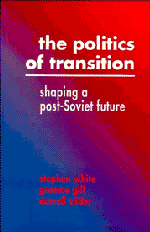Book contents
- Frontmatter
- Contents
- Preface
- 1 Beyond Marxism
- 2 Reforming the electoral system
- 3 Structures of government
- 4 The Presidency and central government
- 5 From union to independence
- 6 Patterns of republic and local politics
- 7 The withering away of the party
- 8 The emergence of competitive politics
- 9 The politics of economic interests
- 10 Public opinion and the political process
- 11 Letters and political communication
- 12 The Soviet transition and ‘democracy from above’
- Notes
- Index
1 - Beyond Marxism
Published online by Cambridge University Press: 27 August 2009
- Frontmatter
- Contents
- Preface
- 1 Beyond Marxism
- 2 Reforming the electoral system
- 3 Structures of government
- 4 The Presidency and central government
- 5 From union to independence
- 6 Patterns of republic and local politics
- 7 The withering away of the party
- 8 The emergence of competitive politics
- 9 The politics of economic interests
- 10 Public opinion and the political process
- 11 Letters and political communication
- 12 The Soviet transition and ‘democracy from above’
- Notes
- Index
Summary
The Soviet system that Gorbachev inherited was ‘ideocratic’ in character. It was a system, in other words, in which a single ideology – Marxism-Leninism – was fundamental to political life and not open to legitimate challenge. It was, in fact, some time before the varied teachings of Marx, Engels and Lenin were synthesised into Soviet Marxism-Leninism, and some time more before that doctrine in its turn became the only framework of discussion that could be employed in all spheres of public life. As late as 1930 the philosopher Losev could refer to dialectical materialism as a ‘lamentable absurdity’, and it was not until the years of fully-fledged Stalinism that literature and art, education and public life more generally were brought under close party control. Editors of all newspapers and journals, from these years onwards, were appointed on party instructions; an elaborate system of censorship monitored whatever they produced; and the doctrine of ‘socialist realism’ (in fact, uncritical support of regime policies) became mandatory in all fields of cultural life. For the theorists of totalitarianism an official ideology of this kind was one of the essential features of a communist system (as it was of Nazi Germany); for others, the regime was simply an ‘ideology’ or ‘utopia in power’.
The place of this official ideology was established, in the Brezhnev years, in the Constitution that was adopted under his guidance in October 1977.
- Type
- Chapter
- Information
- The Politics of TransitionShaping a Post-Soviet Future, pp. 1 - 19Publisher: Cambridge University PressPrint publication year: 1993



